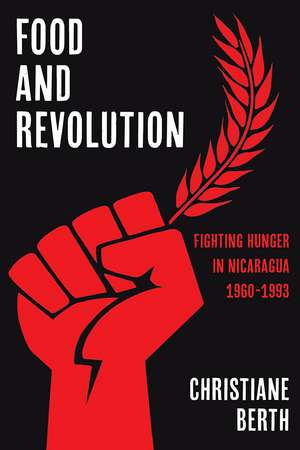Food and Revolution: Fighting Hunger in Nicaragua, 1960-1993: Pitt Latin American Series
Autor Christiane Berthen Limba Engleză Hardback – 23 feb 2021
Din seria Pitt Latin American Series
-
 Preț: 429.67 lei
Preț: 429.67 lei -
 Preț: 450.40 lei
Preț: 450.40 lei -
 Preț: 355.58 lei
Preț: 355.58 lei -
 Preț: 431.62 lei
Preț: 431.62 lei -
 Preț: 392.66 lei
Preț: 392.66 lei -
 Preț: 388.79 lei
Preț: 388.79 lei -
 Preț: 428.14 lei
Preț: 428.14 lei -
 Preț: 362.33 lei
Preț: 362.33 lei -
 Preț: 416.05 lei
Preț: 416.05 lei -
 Preț: 393.58 lei
Preț: 393.58 lei -
 Preț: 330.31 lei
Preț: 330.31 lei -
 Preț: 394.57 lei
Preț: 394.57 lei -
 Preț: 389.76 lei
Preț: 389.76 lei -
 Preț: 334.31 lei
Preț: 334.31 lei -
 Preț: 388.79 lei
Preț: 388.79 lei -
 Preț: 396.85 lei
Preț: 396.85 lei -
 Preț: 350.79 lei
Preț: 350.79 lei - 17%
 Preț: 445.11 lei
Preț: 445.11 lei -
 Preț: 388.03 lei
Preț: 388.03 lei -
 Preț: 365.05 lei
Preț: 365.05 lei -
 Preț: 457.11 lei
Preț: 457.11 lei -
 Preț: 471.15 lei
Preț: 471.15 lei - 17%
 Preț: 384.07 lei
Preț: 384.07 lei -
 Preț: 428.14 lei
Preț: 428.14 lei -
 Preț: 389.17 lei
Preț: 389.17 lei -
 Preț: 394.65 lei
Preț: 394.65 lei -
 Preț: 429.89 lei
Preț: 429.89 lei -
 Preț: 392.66 lei
Preț: 392.66 lei -
 Preț: 424.88 lei
Preț: 424.88 lei -
 Preț: 389.38 lei
Preț: 389.38 lei -
 Preț: 432.57 lei
Preț: 432.57 lei -
 Preț: 419.06 lei
Preț: 419.06 lei -
 Preț: 393.58 lei
Preț: 393.58 lei -
 Preț: 354.23 lei
Preț: 354.23 lei -
 Preț: 458.07 lei
Preț: 458.07 lei -
 Preț: 389.76 lei
Preț: 389.76 lei -
 Preț: 363.26 lei
Preț: 363.26 lei -
 Preț: 502.82 lei
Preț: 502.82 lei -
 Preț: 423.91 lei
Preț: 423.91 lei -
 Preț: 153.64 lei
Preț: 153.64 lei -
 Preț: 351.72 lei
Preț: 351.72 lei -
 Preț: 383.01 lei
Preț: 383.01 lei -
 Preț: 393.58 lei
Preț: 393.58 lei -
 Preț: 351.55 lei
Preț: 351.55 lei -
 Preț: 351.72 lei
Preț: 351.72 lei -
 Preț: 389.76 lei
Preț: 389.76 lei -
 Preț: 331.86 lei
Preț: 331.86 lei -
 Preț: 358.46 lei
Preț: 358.46 lei -
 Preț: 362.95 lei
Preț: 362.95 lei
Preț: 395.54 lei
Nou
Puncte Express: 593
Preț estimativ în valută:
75.70€ • 82.19$ • 63.58£
75.70€ • 82.19$ • 63.58£
Carte disponibilă
Livrare economică 01-15 aprilie
Preluare comenzi: 021 569.72.76
Specificații
ISBN-13: 9780822946045
ISBN-10: 0822946041
Pagini: 296
Ilustrații: 20 b&w illustrations
Dimensiuni: 152 x 229 x 30 mm
Greutate: 0.59 kg
Ediția:1
Editura: University of Pittsburgh Press
Colecția University of Pittsburgh Press
Seria Pitt Latin American Series
ISBN-10: 0822946041
Pagini: 296
Ilustrații: 20 b&w illustrations
Dimensiuni: 152 x 229 x 30 mm
Greutate: 0.59 kg
Ediția:1
Editura: University of Pittsburgh Press
Colecția University of Pittsburgh Press
Seria Pitt Latin American Series
Recenzii
“Food and Revolution is engagingly written and makes excellent use of records from such international organizations as the Food and Agriculture Organization and the Cooperative for Assistance and Relief Everywhere, German and Swiss development assistance archives, newspapers, government documents, nutritional surveys, Frente Sandinista de Liberación Nacional leaders’ autobiographies, and previously gathered testimonies from Contras, peasants, and middle- and low-ranking Sandinistas. The end result is a welcome addition to studies of Nicaragua, the Sandinista Revolution, and its aftermath.” —Hispanic American Historical Review
“Berth adds a new dimension to the research on the rise and fall of the Sandinista National Liberation Front (FSLN) by connecting issues related to food and food shortages to the Nicaraguan Revolution.” —CHOICE
“This book will be of interest to historians of Nicaragua, consumer culture, and the global politics of hunger. Through its multilayered analysis, it shows how the trajectory of the Nicaraguan Revolution was shaped by a range of actors that scholars have not yet considered in much depth, including relief agencies, European and Latin American governments, consumers, and officials concerned with food distribution and agricultural reform. As a result, it is a welcome contribution to an exciting and growing academic debate in which historians of Central America discuss how the international, transnational, and local intersected and shaped the trajectory of the Nicaraguan Revolution.” —H-Net Reviews
“Christiane Berth insightfully combines an analytical focus on food policy and culinary culture in Nicaragua from dictatorship to revolution and then to neoliberalism, all the while paying tribute to the resiliency of the Nicaraguan people.” —Jeffrey M. Pilcher, University of Toronto
“Berth offers us much more than a deep and textured history of food politics and policy in Nicaragua. This book speaks directly to everyone concerned with food security and food sovereignty, the politics of hunger and the possibilities for localization in a globalized consumer culture.” —Richard Wilk, Distinguished Professor and Provost’s Professor Emeritus, Indiana University
“Berth adds a new dimension to the research on the rise and fall of the Sandinista National Liberation Front (FSLN) by connecting issues related to food and food shortages to the Nicaraguan Revolution.” —CHOICE
“This book will be of interest to historians of Nicaragua, consumer culture, and the global politics of hunger. Through its multilayered analysis, it shows how the trajectory of the Nicaraguan Revolution was shaped by a range of actors that scholars have not yet considered in much depth, including relief agencies, European and Latin American governments, consumers, and officials concerned with food distribution and agricultural reform. As a result, it is a welcome contribution to an exciting and growing academic debate in which historians of Central America discuss how the international, transnational, and local intersected and shaped the trajectory of the Nicaraguan Revolution.” —H-Net Reviews
“Christiane Berth insightfully combines an analytical focus on food policy and culinary culture in Nicaragua from dictatorship to revolution and then to neoliberalism, all the while paying tribute to the resiliency of the Nicaraguan people.” —Jeffrey M. Pilcher, University of Toronto
“Berth offers us much more than a deep and textured history of food politics and policy in Nicaragua. This book speaks directly to everyone concerned with food security and food sovereignty, the politics of hunger and the possibilities for localization in a globalized consumer culture.” —Richard Wilk, Distinguished Professor and Provost’s Professor Emeritus, Indiana University
Notă biografică
Christiane Berth is chair of contemporary history at the University of Graz. Her research has provided new insights into global entanglements in technology, communication, food consumption, trade, and migration. For the past decade, she conducted research and taught in academic environments in Europe, Central America, and Mexico.
